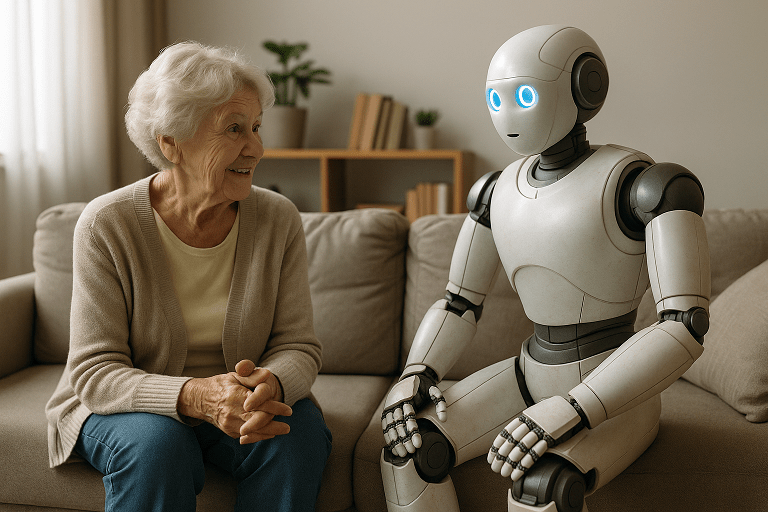In 2025, loneliness and isolation among older adults remain one of the most pressing social health issues. But technology is stepping in — not to replace human connection, but to enhance emotional support, cognitive engagement, and daily interaction. At the heart of this movement is a rapidly growing category: the virtual companion for elderly.
Today’s AI companions aren’t just novelty chatbots or robotic voices — they are increasingly empathetic, responsive, and tailored to the emotional and practical needs of seniors. Families, caregivers, and health providers are turning to these tools not only for companionship, but also for mental stimulation, safety, and peace of mind.
Here are the top 10 virtual companion tools that families across the world trust most in 2025.
1. ElliQ by Intuition Robotics
- Best For: Daily conversation, reminders, wellness check-ins
- Why Families Trust It: Specifically designed for seniors living alone, ElliQ is like a friendly roommate that initiates chats, shares news, encourages physical activity, and reminds users to take medications.
- Bonus: Can detect behavior changes and alert caregivers.
2. Replika AI (Senior Mode)
- Best For: Emotional support and companionship
- Why Families Trust It: Replika’s conversational AI adapts to the user’s personality and grows over time. The senior-friendly version uses slower pacing, large text, and empathetic dialogue.
- Bonus: Available via mobile and smart devices.
3. Tombot Companion Robot Dog
- Best For: Seniors with dementia or cognitive decline
- Why Families Trust It: Looks, feels, and behaves like a real dog without the maintenance. Tombot provides soothing, pet-like interaction that reduces anxiety and loneliness.
- Bonus: Clinically backed for therapeutic use.
4. CareCoach
- Best For: Round-the-clock virtual care support
- Why Families Trust It: A mix of human-backed AI and cartoon avatars that engage in conversations, check routines, and offer support. Human staff monitors interactions and responds through the avatar.
- Bonus: HIPAA-compliant — used in eldercare facilities and at home.
5. Memory Lane (by BBC & Syntropy)
- Best For: Reminiscence therapy and memory engagement
- Why Families Trust It: Uses AI to conduct conversations rooted in the senior’s personal memories. Great for cognitive stimulation, especially for individuals with early-stage dementia.
- Bonus: Integrates family stories and photos for emotional resonance.
6. Joy for All Companion Pets (by Ageless Innovation)
- Best For: Touch-based emotional support
- Why Families Trust It: Lifelike robotic cats and dogs that respond to touch and sound. No need for feeding or walking, just cuddly comfort — especially effective in memory care.
- Bonus: Affordable and non-digital (no screens needed).
7. Alexa Together (by Amazon)
- Best For: Voice-activated companionship and smart home support
- Why Families Trust It: Offers emergency contact features, drop-in calls, and routines that keep seniors safe and connected. Can be integrated with other devices and family accounts.
- Bonus: Easy to set up and widely accessible.
8. Rementia
- Best For: Dementia-friendly chatbot interactions
- Why Families Trust It: Gentle conversation prompts, visual cards, and personalized activity suggestions designed for users with memory impairments.
- Bonus: Web-based and accessible on tablets.
9. Pillo Health Companion
- Best For: Medication and health reminders
- Why Families Trust It: Smart voice assistant with a pill dispenser that communicates with seniors and caregivers. Tracks medication adherence and health trends.
- Bonus: Secure remote caregiver access.
10. Intuition Companion App
- Best For: Daily emotional check-ins
- Why Families Trust It: Uses AI to assess emotional states via simple conversations and recommends mood-boosting activities or prompts loved ones to check in.
- Bonus: Lightweight app with family dashboard.
The Value of a Virtual Companion for Elderly in 2025
Virtual companions offer more than convenience — they’re part of a larger movement toward aging with dignity, connection, and autonomy. The best solutions combine technology and empathy, offering tools that:
- Combat social isolation
- Stimulate cognition and memory
- Support physical and mental health
- Offer peace of mind for families and caregivers
As AI and robotics continue to evolve, virtual companions are proving to be trusted, responsive partners in eldercare, delivering warmth, safety, and engagement where it’s needed most.
